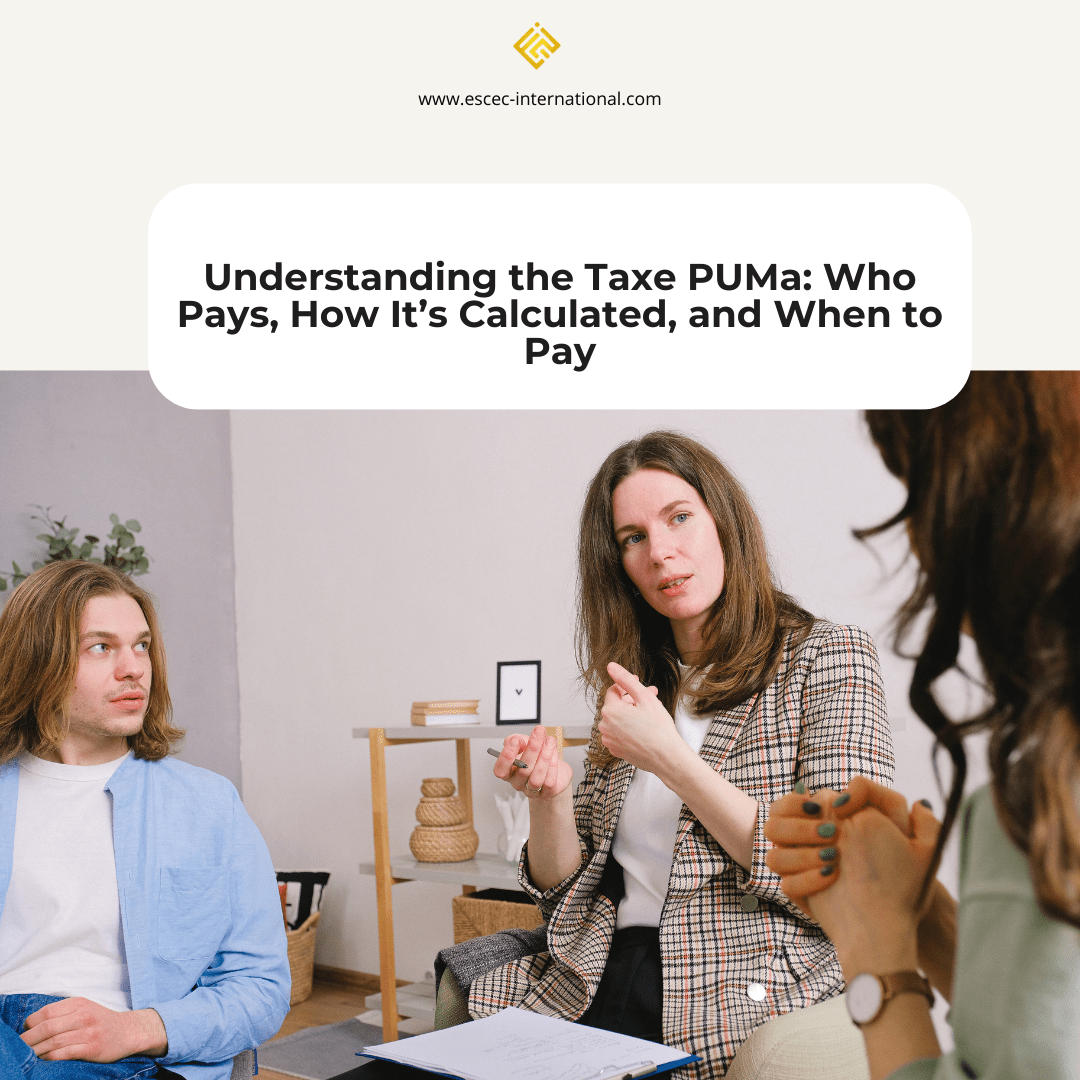Understanding the Taxe PUMa: Who Pays, How It’s Calculated, and When to Pay
/in Blog /by escecIf you are covered under France’s Universal Health Protection scheme, known as PUMa, you may be subject to it also referred to as the Supplemental Health Contribution (CSM). This article explains in detail what the taxe PUMa is, who needs to pay it, how it’s calculated, and how to handle payment obligations.
What Is the Protection Universelle Maladie (PUMa)?
PUMa (Protection Universelle Maladie) guarantees that anyone residing or working legally and stably in France has access to health coverage. It includes coverage for medical care and maternity expenses.
To explore eligibility criteria or to apply, visit the official health insurance site: ameli.fr.
Depending on your income, you might be liable for a contribution to the French healthcare system through it, also known as the CSM.
What Is the Taxe PUMa (CSM)?
It or Cotisation Subsidiaire Maladie (CSM), is a contribution required from individuals benefiting from PUMa coverage if their income meets certain thresholds.
The tax is based on data provided by the French tax authorities and calculated accordingly.
Who Is Required to Pay the Taxe PUMa?
You are subject to it if you meet all three of the following conditions:
You reside in France on a stable and legal basis, or you work there.
Your earned income in France is below €8,798 for the year 2023 (20% of the PASS – Plafond Annuel de la Sécurité Sociale).
Your capital or investment income falls between €21,996 (50% of the PASS) and €351,936 (8 times the PASS).
Specific Rule for Couples
If both partners in a married or PACSed couple earn less than €8,798 in professional income, then the CSM applies. If either partner earns more than that threshold, neither is liable for the taxe PUMa.
For more details, you can refer to the official URSSAF page:
🔗 Taxe PUMa information on URSSAF
Who Is Exempt from the Taxe PUMa?
You are not required to pay it if you fall under one of these categories:
Minor children who do not engage in paid work in France.
Religious personnel.
Individuals receiving a retirement pension, disability pension, annuity, or unemployment benefits for the year in question.
Employees of international organizations located in or outside France (e.g., UNESCO, OECD, UN).
Cross-border workers in Switzerland, who contribute via a dedicated health tax for Swiss residents.
Income Considered for Calculating the Taxe PUMa
The taxe PUMa is calculated based on the following types of income:
Rental income (revenus fonciers)
Investment income (capitaux mobiliers)
Capital gains from asset sales
Non-professional profits from industrial, commercial, or liberal activities
These revenues are taken into account only if they exceed 25% of the PASS, as defined under Article 1417 IV of the French General Tax Code.
Married, PACSed, or Single? Taxe PUMa Rules for Each Case
Married or PACSed (Joint Tax Filing)
The taxable capital income is divided between both individuals. Each benefits from a deduction equivalent to 50% of the PASS, which reduces the taxable base for the taxe PUMa.
Single, Divorced, or Widowed
All capital income is considered, and the same 50% PASS deduction is applied to the individual’s taxable amount.
Taxe PUMa Rate and Calculation Formula
The taxe PUMa uses a degressive rate, starting at 6.5% and decreasing as earned income approaches €8,798 (20% of the PASS). If this threshold is met, the taxe PUMa becomes zero.
Formula:
CSM = 6.5% × (A – 0.5 × PASS) × [1 – R ÷ (0.2 × PASS)]
Where:
A = capital income base (maxed at 8 × PASS)
PASS = Plafond Annuel de la Sécurité Sociale
R = earned income from professional activity in France
This formula ensures that the more professional income you earn, the lower your taxe PUMa obligation will be.
When Is the Taxe PUMa Due?
The contribution is assessed in the fourth quarter of the year, using income information from your previous tax return.
A payment notice is sent toward the end of the year.
You have 30 days after receiving it to pay.
Late Payment Penalties:
5% surcharge for late or partial payments.
An additional 0.4% per month penalty applies after the due date.
You can request a grace period or penalty waiver through your online account. Select “Request for cancellation of penalties and/or surcharges” and clearly explain your reason for the delay. The waiver may be full, partial, or rejected, depending on your case.
Need help understanding your French tax obligations? 👉 Check out our full guide here:
🔗 Understanding Tax Identification Numbers in France
How to Pay the Taxe PUMa?
The preferred method is online payment through your PUMa portal, which provides a secure and traceable method.
Alternatively, you can pay by:
Cheque
Bank transfer
For optimal follow-up and processing, online payment remains the most efficient choice.


